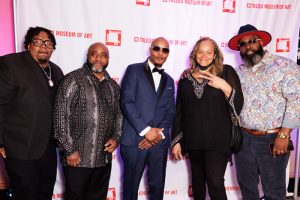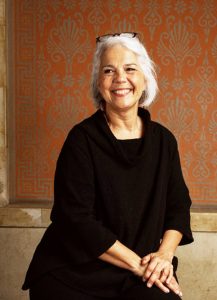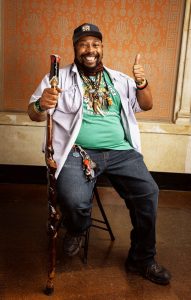
By Fletcher Word
The Truth Editor
Robin Sulier-Charney, ProMedica’s oncology community liaison, began speaking to barbers in 2017 after developing an understanding through her research that such advocates would be an effective way to reach the Black male population that has such disproportionately high cancer mortality rates.
“I was hoping to create bridges and begin the conversation to develop trust,” says Sulier-Charney of her efforts. “I wanted the guys to know that there are people that can be trusted.”
Sulier-Charney and ProMedica then started supplying barbers with health screening, health education and resources for their clients and, from that collaboration, grew ProMedica’s Black Barbershop Initiative, a group of 10 barbershop owners, working with cardiologist Dr. Brian Dolsey, “trying to define what do we want to work on,” recalls Sulier-Charney.

That collaboration resulted in a mental health first aid workshop that “barbers could easily relate to,” says Sulier-Charney. Several pointed out to her that listening to their clients on an everyday basis was exactly what they did in their everyday lives and what the workshop emphasized.
One program that emerged was the “Art of the Cut,” an annual event hosted by the Toledo Museum of Art, during which local Black barbers performed haircuts in styles ranging from the 1950s to 2000s.
One project that emerged from Art of the Cut was Sons of Toledo, a short film that officially premiered on March 26 in the Toledo Museum of Art’s Peristyle. The film, co-written by Matt Foss, an associate professor of theatre at the University of Toledo, and Monty Cole, a Chicago-based film director who also directed the film, came about when Foss had the opportunity to sit in during the first “Art of the Cut” event and listen to the barbers’ discussions about life in a Black barbershop.
“Black barbers are leaders and have started all sorts of programs – they have taken initiatives,” says Sulier-Charney.
Sons of Toledo’s opening scene reenacts a call to a barbershop – a mother calling her son to inform him that his little brother has been killed and would he go to the morgue to give him one final haircut.
The main part of the film takes place in P and J’s Da Shop in East Toledo – a documentary part of the film featuring participants such as Jeremy Pratt, whose uncle Jamal Grant owns the shop, talking about what the shop has meant to him and barbershops in general mean to the Black community. Pratt is now completing law school, the first in his family to go to college.

Sons of Toledo is now available for all to view online.
Sulier-Charney’s work with the local Black barbershops was slowed by the pandemic but not halted. All of the shops closed for a while but many took that time when they couldn’t cut hair to focus on other matters – working on the physical areas or trying to cope with issues of clients’ mental health – issues exacerbated by the pandemic.
“I was really impressed,” says Sulier-Charney. “They were prepared; they asked ‘what can we do while we are waiting?’”
Now that life is almost back to normal, there is more for Charney to focus on.
“For five years I’ve been going in giving information, getting information for the social determinants of health, talking about what they hear. We are following the lead of the barbers and using research-based evidence.”
For her work in the community, Sulier-Charney is this year’s YWCA Milestones honoree for Social Services.
A graduate of Whiteford Agriculture High School, Sulier-Charney began her college career in her 40s studying sociology and justice at Lourdes and then earning a graduate degree at the University of Toledo in criminal justice under the guidance of then-Professor Morris Jenkins.
“Reducing recidivism was my passion as was being part of the community to mitigate horrible injustices,” she says.


